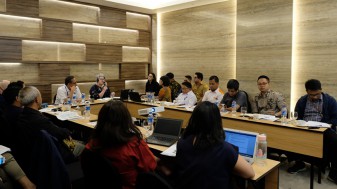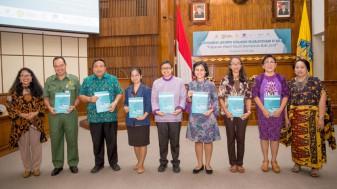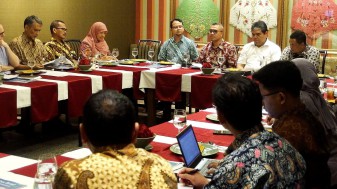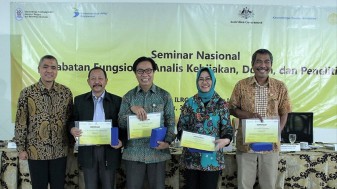The Indonesian Government has a set of laws and derivative regulations in place that accommodate the needs of people with disabilities. However, the implementation of these rules has not been optimal in practice. One of the reasons is the lack of integrated data on groups of people with disabilities in Indonesia.
This was the main theme of a discussion entitled, ‘KSIxChange#39 Strengthening Disability Inclusion Aspects in the Knowledge-to-Policy Integration Process (K2P)’. The event, which took place on Thursday 2 December, was organised by the Knowledge Sector Initiative (KSI). A number of speakers presented: the Chairman of the Indonesian People with Disabilities Association (PPDI), Gufroni Sakaril, PRAKARSA researcher Eka Afrina Djamhari, the President of the Australia Indonesia Disability Research and Advocacy Network (AIDRAN), Dina Afrianty, the Secretary General of the ASEAN Disability Forum and Chair of the Indonesian Women with Disabilities Association (HWDI), Maulani A Rotinsulu, the Executive Director of Migrant Care, Wahyu Susilo, a researcher at PUI-PT PPH PUK2IS Atma Jaya Unika, Gaby Gabriela Langi, and the Principal Researcher of the Political Research Centre at the National Research and Innovation Agency (BRIN), Tri Nuke Pudjiastuti.
In her opening speech, Jennifer Donohoe, the Acting Counsellor, Development Effectiveness and Sustainability, Australian Embassy Jakarta, said the involvement of people with disabilities in Australian foreign policy had brought about changes over the last decades, including inclusive development strategies in Australia’s foreign aid programmes. In response to the COVID-19 pandemic, all assistance programmes focused on reducing the impact of the pandemic on vulnerable groups, including people with disabilities.
“Unfortunately, the limited availability of data on persons with disabilities in Indonesia makes it difficult for us to find solutions for them,” Ms. Donohoe said. “Therefore, we hope that through KSI, we will strengthen collaboration networks with policymakers and groups of people with disabilities, as well as promote the strengthening of research and policies that are more inclusive.”
According to Gufroni Sakaril, the impact of the COVID-19 pandemic on people with disabilities needs to be tackled with an integrated solution from all stakeholders. These impacts include, among others, termination of employment, drastic pay cuts (for those who are still employed), and limited opportunities to communicate with others due to restrictions imposed by the government. “It is necessary to sit down with stakeholders and advocate for the government to formulate appropriate policies for persons with disabilities during the COVID-19 pandemic,” he said.
Based on PRAKARSA's research, Eka Afrina Djamhari said that people with disabilities were the most vulnerable group to be included in the category of ‘highest poor group’. Government assistance in the form of social protection to reduce the impacts of the pandemic has not yet fully touched groups of people with disabilities. These groups have found it increasingly difficult to access public services during the pandemic, such as health, education and job services.
“In terms of infrastructure, for example, not all Puskesmas or hospitals have proper infrastructure for persons with disabilities,” Eka said. “Likewise, information about health services is not friendly to the various types of disabilities,” she added.
The same message was conveyed by Dina Afrianty. The issue of mobility was still a major factor for people with disabilities, especially during COVID-19. In teaching and learning activities, from elementary to tertiary levels, no transportation facilities were accessible to people with disabilities. Educational institutions were also not sensitive to implementing inclusive education that accommodated the needs of people with disabilities.
“Indeed, we already have Law Number 8 of 2016 concerning Persons with Disabilities, along with its derivative regulations,” Dina said. “However, it has not been optimally practiced. Of the many universities in Indonesia, only 11 universities have disability service units.”
The same situation is also happening across mental health services. According to Gaby Gabriela Langi, COVID-19 has made it increasingly difficult for patients with mental problems or mental disorders to obtain mental health services at the Puskesmas or hospitals. More significant advocacy is needed to reshape and reorganise the delivery of mental health services during the pandemic.
The Power of Data
In terms of employment, Migrant Care observed that no data had been collected by the government regarding cases of migrant workers experiencing violence. This was despite the fact that such cases could potentially cause these workers to become a person with disabilities. In the absence of such data, when newly disabled migrant workers returned to Indonesia, there were no proper aids or services to support them.
“The same challenges were faced by migrant workers who returned to Indonesia,” Wahyu Susilo said. “The training provided by the government cannot be accessed by those who have new disabilities. These are aspects that are missing in terms of fulfilling disability rights.”
The importance of data on people with disabilities in Indonesia was also conveyed by Maulani A Rotinsulu. Even though it has been accommodated in Law No. 8/2016, data on people with disabilities in Indonesia is still aggregated, with no data disaggregated by name or address. As a result, not all people with disabilities can benefit from development programmes implemented by the government through various ministries.
“There is a need for collaboration between government agencies, such as the Central Statistics Agency, the Ministry of Home Affairs and the Ministry of Social Affairs, and associations of persons with disabilities to assess or measure the participation of persons with disabilities in the development process,” Maulani said. “They must be covered and have access to development benefits, and policy instruments need to be developed to ensure this.”
Tri Nuke Pudjiastuti admitted that research on disability in Indonesia was still inadequate. It should be advocated that any research regarding public interest should include disability indicators. Such research should be promoted to encourage the policymaking process in Indonesia to develop inclusive policies that are friendly to and can accommodate the interests of people with disabilities.
This discussion was also a forum to gather inputs and ideas to support BRIN in designing programmes as part of UNESCO's Management of Social Transformation (MOST). It was expected to be a starting point for a joint action plan using UNESCO’s MOST as a force to promote the development of more inclusive policies.
KSIxChange is an interactive discussion initiated by the Knowledge Sector Initiative (KSI), a partnership between the governments of Indonesia and Australia with funding from the Australian Department of Foreign Affairs and Trade (DFAT). KSIxChange, which is held at least once per month, aims to support the implementation of government programmes through increasing public discourse, based on the use of evidence in the policymaking process. (*)





